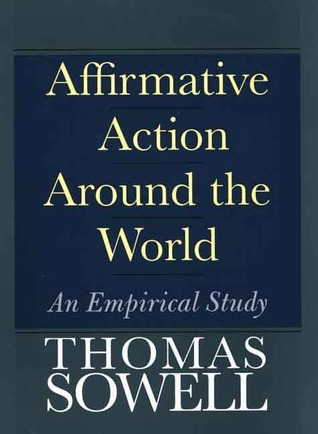
In this important book, an eminent authority presents a new perspective on affirmative action, investigating its actual consequences in the United States and in other countries where it has been in effect. Evaluating his empirical data, Thomas Sowell concludes that race preference programs worldwide have not met expectations and have often produced the opposite of what was originally intended. “A delight: terse, well-argued, and utterly convincing.”—Economist “Among contemporary economists and social theorists, one of the most prolific, intellectually independent, and iconoclastic is Thomas Sowell... Enormously learned, wonderfully clear-headed, he sees reality as it is, and flinches at no truth... Sowell’s presentation of the data is instructive and illuminating—and disturbing.”—Carl Cohen, Commentary “Another brilliant, bracing achievement by Thomas Sowell. With characteristic lucidity, erudition, and depth, Sowell examines the true effects of affirmative action around the globe. This book is compelling, important, mind-opening.”—Amy Chua, author of World on Fire: How Exporting Free Market Democracy Breeds Ethnic Hatred and Global Instability “A masterpiece that deserves to be one of the most influential books of our time. Any honest reader will be informed and enlightened.”—Donald Kagan, Yale University “A gem of a book. A brilliant and learned analysis of the negative effects of racially preferential policies both in the United States and in several other countries around the world.”—Stephan Thernstrom, Harvard University
Author

Thomas Sowell is an American economist, social commentator, and author of dozens of books. He often writes from an economically laissez-faire perspective. He is currently a senior fellow of the Hoover Institution at Stanford University. In 1990, he won the Francis Boyer Award, presented by the American Enterprise Institute. In 2002 he was awarded the National Humanities Medal for prolific scholarship melding history, economics, and political science. Sowell was born in North Carolina, where, he recounted in his autobiography, A Personal Odyssey, his encounters with Caucasians were so limited he didn't believe that "yellow" was a hair color. He moved to Harlem, New York City with his mother's sister (whom he believed was his mother); his father had died before he was born. Sowell went to Stuyvesant High School, but dropped out at 17 because of financial difficulties and a deteriorating home environment. He worked at various jobs to support himself, including in a machine shop and as a delivery man for Western Union. He applied to enter the Civil Service and was eventually accepted, moving to Washington DC. He was drafted in 1951, during the Korean War, and assigned to the US Marine Corps. Due to prior experience in photography, he worked in a photography unit. After his discharge, Sowell passed the GED examination and enrolled at Howard University. He transfered to Harvard University, where he graduated magna cum laude with a Bachelor of Arts degree in Economics. He received a Master of Arts in Economics from Columbia University, and a Doctor of Philosophy in Economics from the University of Chicago. Sowell initially chose Columbia University because he wanted to study under George Stigler. After arriving at Columbia and learning that Stigler had moved to Chicago, he followed him there. Sowell has taught Economics at Howard University, Cornell University, Brandeis University, and UCLA. Since 1980 he has been a Senior Fellow of the Hoover Institution at Stanford University, where he holds a fellowship named after Rose and Milton Friedman.